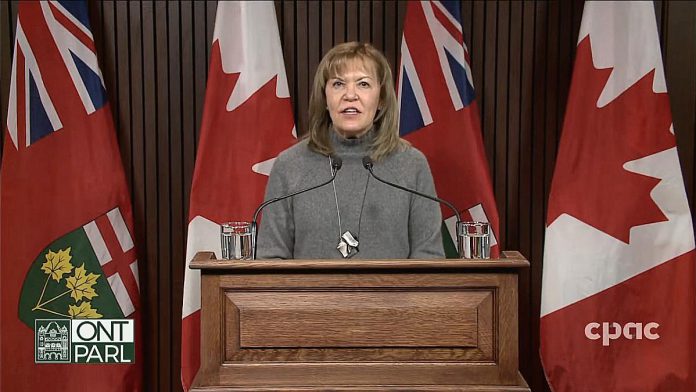
The provincial government announced a series of measures on Friday (December 10) intended to further encourage Ontarians to get vaccinated and to help limit the spread of COVID-19 and the omicron variant.
The measures include strengthening proof of vaccination requirements, enhanced public health measures, and additional rapid antigen testing.
The announcement comes on the same day Ontario reported 1,453 COVID-19 cases, the highest daily increase in six months, and that the omicron variant has been detected in 10 per cent of COVID-19 test result samples tested at Public Health Ontario.
“With cases expected to increase during the winter months, and as we continue to monitor the evolving global evidence around the omicron variant, we must remain vigilant,” said Ontario health minister Christine Elliott at a media conference at Queen’s Park, also attended by Dr. Kieran Moore, Ontario’s chief medical officer of health.
“We’re still learning about the new variant, but we can expect the months ahead may be very challenging,” Elliott added. “The actions we take today will help ensure that our communities stay safe this winter.”
The government will not be lifting proof of vaccination requirements on January 17, 2022, as originally announced in October.
“This is aligned with Ontario’s reopening plan, which required an absence of concerning trends before gradually lifting further public health measures,” Elliott said.
Effective January 4, the province will require the use of the enhanced vaccine certificate with QR code and the Verify Ontario app in settings where proof of vaccination is required. Previous versions of vaccine certificates without the QR code will no longer be accepted.
“We understand that not everyone has access to, or is comfortable, with technology,” Elliott said. “That is why people can save the electronic version of their QR code to their phone, or print a paper copy. Business must accept both electronic and paper versions. If individuals need help printing, they can visit their local library or call the Provincial Vaccine Contact Centre to have their vaccine certificate mailed to them. They can also visit a ServiceOntario Centre to receive a printed copy.”
With Ontarians aged 50 or older eligible for booster doses starting Monday (December 13), Elliott said vaccines are the single best defence against COVID-19 infection.
“I want to strongly urge everyone to get vaccinated and to get your booster doses as soon as you are eligible to do so,” Elliott said. “In no uncertain terms, vaccines work.”
Starting on December 15, the province will begin a new process to provide an enhanced COVID-19 vaccine certificate with QR code for people who have an eligible medical exemption to vaccination, or who are participating in an approved COVID-19 vaccine clinical trial.
People who have an eligible medical exemption for vaccination must ask an Ontario physician or registered nurse to submit their exemption directly to the public health unit where the medical practice is located. The enhanced COVID-19 vaccine certificate with QR code for medical exemptions will be required in settings where proof of vaccination is required as of January 10, when organizations and businesses will be advised to no longer accept physician notes.
Starting on December 20, Ontario will also begin requiring proof of vaccination for youth aged 12 to 17 years of age who are participating in organized sports at recreational facilities.
Effective January 4, Ontarians aged 18 and over will be eligible to schedule their booster dose appointment through the online COVID-19 vaccination portal, by calling the Provincial Vaccine Contact Centre, through Indigenous-led vaccination clinics, select pharmacies and primary care settings. Appointments will be booked for approximately six months (168 days) after a second dose.
The government is also strongly advising Ontarians to limit their social gatherings over the holiday season, and to take additional precautions if all people attending such gatherings are not fully vaccinated or if their vaccination status is unknown.
“Please keep your social contacts to a minimum — your gatherings should be small and you should limit the number of gatherings you attend,” Dr Moore said. “Know the rules in your local public health jurisdiction. If you are planning on hosting holiday events, it is advisable to ensure everyone in attendance is fully vaccinated, especially if seniors or immuno-compromised people are attending.”
“Wear a mask if there are vulnerable people in attendance, even if you are fully vaccinated. We all have a responsibility to protect each other. We do not want this holiday season to become a superspreading event.”
The government is also asking employers in all industries to allow employees to work from home if possible.
The province will also be increasing rapid antigen testing for high-risk congregate settings, including antigen testing for all staff, essential caregivers, and visitors to long-term care homes (regardless of vaccination status) who have travelled to any country outside of Canada (including the US) prior to entering a home.
In addition, Ontario will be initiating threshold-based rapid antigen testing in school settings, effective on the return to school in January. Public education videos are available to support usage of the rapid antigen screening kits and the at-home PCR self-collection COVID-19 testing for students. They will be available on December 13 in English, French, and in 15 additional languages.
The province is also launching a holiday testing blitz offering voluntary rapid antigen screening to asymptomatic people free of charge. Two million rapid tests will be provided at pop-up testing sites in high-traffic settings such as malls, retail settings, holiday markets, and transit hubs.



























